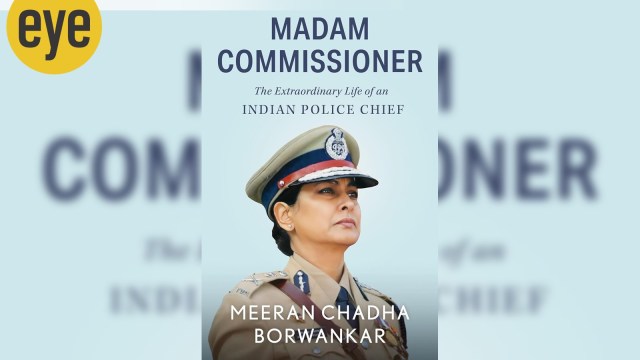IPS officer Meeran Chadha Borwankar’s account of her career outlines the challenges and exhilarations of being a trailblazer in a man’s world
Borwankar never compromised on professionalism, integrity, and discipline, despite encounters with sexism and harassment
 Madam Commissioner: The Extraordinary Life of an Indian Police Chief, Meeran Chadha Borwankar, Pan Macmillan, 296 pages, Rs 499. (Source: Amazon)
Madam Commissioner: The Extraordinary Life of an Indian Police Chief, Meeran Chadha Borwankar, Pan Macmillan, 296 pages, Rs 499. (Source: Amazon)Written by Rajinder Vij
Madam Commissioner: The Extraordinary Life of an Indian Police Chief by Meeran Chadha Borwankar is a refreshing account of the highs and lows of an Indian Police Service (IPS) officer’s career. The book is a vivid and inspiring account of the 36-year-long career of an IPS officer from the Maharashtra cadre, who was the only woman in her 1981 batch. The book reaffirms that women can play an equal and substantial role in law enforcement.
In the initial chapters, Borwankar details her training regimen at the National Police Academy (NPA) as “very tough” but “interesting and challenging”. She would stand by the belief of Yadav Ustad, who had been training her, that “women have steadier hands”, referring to her good scores at a firing session. But she also refused to cut her hair short because she found the instructions “illogical” and “had never been late in getting ready”.
Despite her status as an officer, she had to experience distasteful moments during her service. Her own batchmate at NPA propositioned her, knowing well that she was married. When she was posted as Inspector-General of Police at the Crime Investigation Department in Pune, her superior passed lewd remarks at her in meetings. Borwankar, though, stood up for herself in each instance of harassment. Her batchmate was given a strict warning by authorities. The front page of a newspaper reported later that even a “woman police officer could be sexually harassed by a colleague.”
Borwankar never compromised on professionalism and integrity, traits wanting in public servants nowadays. When derogatory news was published in two prominent newspapers on her “failure to nab Haseena”, a gangster, she not only filed defamation cases against the newspapers, but also forced them to tender a written apology on the front page before arriving at a compromise. In another case, even though some land of the Yerawada police station had already been auctioned by the time the author joined as CP, Pune, and advance money deposited with the government, she refused to hand over the prime land and got the land transfer order reversed by the government.
Borwankar writes, “The fact is that gender is inconsequential when it comes to handling public order clashes: women have shown as much courage as men and stood their ground.” As Deputy Commissioner of Police, Mumbai, she never missed an opportunity to reach the spot and take charge. She once tricked rioters in a Mumbai chawl by using her presence of mind and firing tear-gas shells in place of one-round fires to bring the situation under control.
Borwankar was a strict disciplinarian. She maintained top secrecy as Director General of Prisons when the terrorist Ajmal Kasab was transferred from Arthur Road to Yerawada and hanged — “not even a bird chirped,” she writes — adding that he was never served any “special dish” like biryani, as publicised. Borwankar did not allow any favours to Bollywood actor Sanjay Dutt either, sentenced to prison under the Arms Act. She also got the court order reversed which let him eat home-cooked food in prison, a facility available only to undertrials.
The book also details how Borwankar handled white-collar crimes during her stint in the Central Bureau of Investigation. She talks about her attempts to rehabilitate minor victims of human trafficking and prostitution, with the help of NGOs, and the pioneering role her team played in solving the interstate theft case of Joyalukkas (Hyderabad) by working meticulously on the criminals’ modus operandi. A chapter on the sensational 1994 Jalgaon sex scandal is an assertion that even cases reported with delay and dented with poor medical evidence can lead to conviction, if handled professionally.
This gripping book, full of diverse first-hand anecdotes, written by a decorated IPS officer, is a must-read for those who care for law enforcement, women empowerment and inclusiveness, as well as for other stakeholders of the criminal justice system who wish to bring about change and strengthen the rule of law.
Vij is a retired IPS officer of the Chhattisgarh cadre





- 01
- 02
- 03
- 04
- 05


























